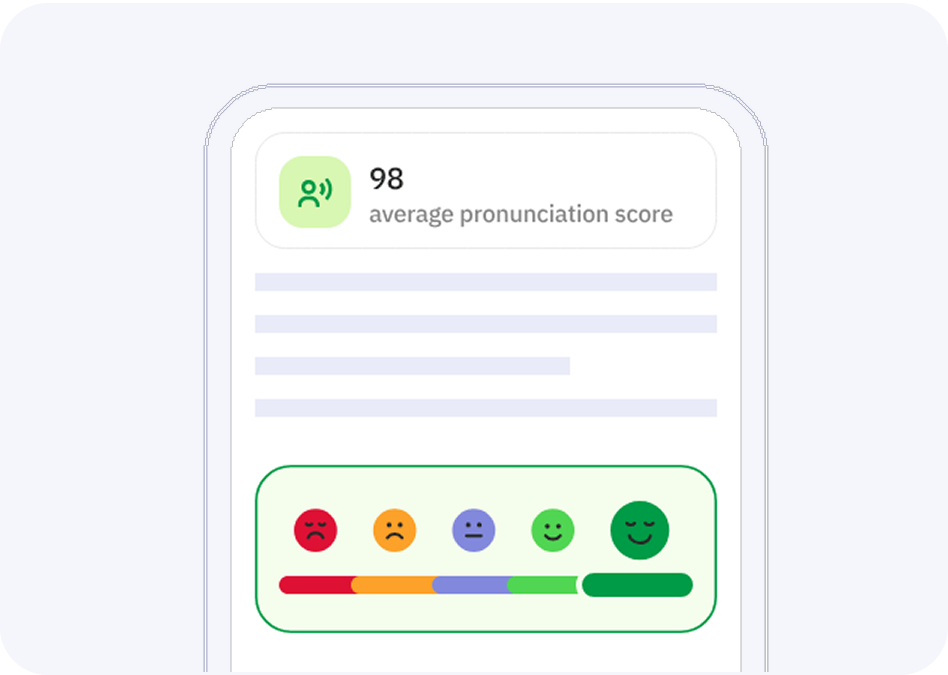Spoken French Practice With AI
Mastering French opens doors to a renowned culture, exquisite cuisine, and influential business and political landscapes worldwide. However, understanding written French is just the tip of the iceberg; real fluency comes when you can confidently converse in French. Spoken French practice is vital for anyone looking to genuinely connect with the language and its native speakers. From digital tools like Talkpal AI to traditional study methods, enhancing your spoken French abilities is more accessible today than ever before.

The talkpal difference

Personalized Education
Everyone absorbs information differently. By utilizing Talkpal's advanced capabilities, we analyze the study habits of millions of users at once to build highly effective educational environments that adapt to the specific needs of every student.

Cutting-Edge Technology
Our main mission is to lead the way in providing accessible and tailored educational journeys for everyone by leveraging the most recent breakthroughs in modern innovation.

Making Learning Fun
We have transformed education into an entertaining activity. Since staying motivated can be difficult in a digital setting, we designed Talkpal to be incredibly captivating so that users actually prefer building new communication skills over playing video games.
LANGUAGE LEARNING EXCELLENCE
The most efficient way to learn a language
Try Talkpal for freeDiscover the Essentials of Spoken French Practice
1. Embrace Technology for Interactive Learning
Technology, particularly AI-driven platforms like Talkpal AI, revolutionizes the way we learn languages. These interactive tools not only offer lessons tailored to your current level but also allow you to practice spoken French in real-world scenarios via simulations. This form of practice is crucial because it closely mirrors everyday conversations and enhances both your listening and speaking skills.
2. Engage in Regular Conversation Practice
The key to fluency is regular conversation. Engaging with native speakers, whether through language exchange apps or community meet-ups, provides real-time, practical experience that is invaluable. This interaction allows learners to understand idiomatic expressions and cultural nuances that are often not covered in formal education. Consistent spoken French practice with native speakers smooths out pronunciation and improves comprehension skills over time.
3. Listening is as Important as Speaking
To improve your spoken French, intensive listening practice is essential. Spend time listening to French podcasts, movies, and music. This will not only enhance your understanding of different dialects and accents but also tune your ear to the natural flow of the language. Regular exposure to spoken French sharpens your listening skills, a crucial component in effectively responding during conversations.
4. Record and Review Your Speech
Recording yourself can be a powerful tool in advancing your spoken French. By listening to your recordings, you can catch mistakes in pronunciation, grammar, and rhythm. This exercise promotes self-awareness of your language skills and helps track progress. Reviewing and adjusting based on feedback from peers or mentors makes this practice even more effective.
5. Utilize Language Games and Challenges
Incorporate games and challenges that focus on spoken French into your learning routine. Tools like Talkpal AI often feature gamified elements that make learning fun and engaging. These activities boost your speaking confidence and help embed vocabulary and grammatical structures in your memory through playful yet impactful repetition.
6. Leverage Social Media and Online Communities
Participate in French-speaking forums, Facebook groups, or Twitter threads. These platforms offer a spectrum of topics and discussions where you can assimilate slang, colloquial phrases, and contemporary language usage. The casual nature of social media dialogue can mimic everyday spoken French, providing excellent practice opportunities.
7. Attend French Cultural and Social Events
Whether it’s a French film screening, a cooking class, or a meet-up group, participating in activities centered around French culture can enhance your language practice. These settings usually attract other French speakers and provide a relaxed environment for conversation, making them perfect for practical spoken French application.
8. Read Out Loud
Reading French texts aloud is a unique strategy that combines both speech and hearing elements of language practice. Choose materials that interest you to maintain motivation. This practice helps in mastering pronunciation, intonation, and rhythm, making your spoken French sound more natural and fluent.
9. Incorporate Shadowing Techniques
Shadowing involves repeating after a native speaker immediately as you hear them. This method can significantly improve your accent, speech pace, and fluency. Use audio books, speeches or radio talks for this exercise, mimicking nuances and intonation patterns for better spoken French mastery.
10. Set Clear Goals and Reflect
Setting specific, measurable goals for your spoken French practice enables focused learning and provides motivation. Regular reflection on your progress helps adjust your learning plan according to your needs. Whether it’s achieving a certain level of comfort in casual conversation or delivering a persuasive speech, clear goals guide your practice effectively.
By integrating these strategies into your daily routine, spoken French practice can be both enjoyable and highly productive, setting you on a path to fluency and beyond.
The most efficient way to learn a language
Try Talkpal for freeFrequently Asked Questions
How often should I practice speaking French to become fluent?
What are the best tools for practicing spoken French?
Is it necessary to be in a French-speaking country to practice effectively?
How can beginners effectively practice spoken French?
What common challenges do learners face with spoken French and how can they overcome them?







